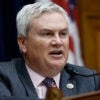If today’s oral arguments in the D.C. gun ban case are any indication, the nation’s most restrictive gun-control law could soon be ruled unconstitutional. Today’s hearing before the Supreme Court revealed that Justice Anthony Kennedy is far more inclined to support an individual right to keep and bear arms than anyone might have suspected.
Supreme Court reporter Lyle Denniston of SCOTUSblog offered this take on the oral arguments:
The Supreme Court’s historic argument Tuesday on the meaning of the Constitution’s Second Amendment sent out one quite clear signal: individuals may well wind up with a genuine right to have a gun for self-defense in their home. But what was not similarly clear in the hearing on District of Columbia v. Heller (07-290) was what kind of gun that would entail, and thus what kind of limitations government could put on access or use of a weapon. In an argument that ran 23 minutes beyond the allotted time, Justice Anthony M. Kennedy emerged as a fervent defender of the right of domestic self-defense.
Denniston was hardly alone in that view. The Los Angeles Times was so confident of the outcome that its headline boldly stated: “U.S. Supreme Court seems poised to strike down D.C. handgun ban.” ABC News Legal Correspondent Jan Crawford Greenburg reported, “A majority of the justices clearly seemed to embrace the idea that the 2nd Amendment protects an individual right to own a gun—and that the government can’t ban guns completely.” And Heritage legal scholar Robert Alt said, “Given the tenor of the questions, it appears that the court is heading toward a 5-4 decision in favor of the Mr. Heller and his attorney Alan Gura, who challenged the D.C. gun ban.”
That type of analysis is exactly what Second Amendment lawyer Alan Gura wanted to hear. As RedState contributor Adam C noted today, Gura’s job was “working on getting the 5th vote, not the first. His arguments are geared toward Kennedy and Breyer, not the press or voters.”
Supporters of the D.C. gun ban, including Mayor Adrian Fenty, put their best spin on the hearing. But even in defending the law, Fenty offered a weak case. “The fact that we have had a handgun ban has significantly curtailed the number of violent crime in the city as is evidenced by the fact that violent crime has gone down since the law was enacted.” In fact, since D.C. first instituted its handgun ban, there has been only one year (1985) that the homicide rate in the city fell below what it was in 1976.
A decision likely won’t be announced until the end of the court’s term in June.





























